Podcast: Download (Duration: 42:50 — 39.4MB)
Get Notified Of Future Episodes Apple Podcasts | Spotify | Amazon Music | Android | Blubrry | Gaana | TuneIn | Deezer | Anghami | RSS | More
Episode highlights:
00:55 – How it all started
03:09 – An interesting time
05:35 – Changes in the field of marketing
10:58 – The London adventure
15:44 – An incident in Dubai
17:11 – From organizers to members
19:27 – Giving a result first
21:03 – Since the heyday of the press release
23:24 – Other content Kerry does
24:58 – Content issues to consider
26:04 – The actual crafting
28:02 – The surprise that is LinkedIn
30:05 – Repurposing factors
31:45 – Memories from the past decade
36:42 – Where are things going?
38:26 – The case of the lawyer client
40:18 – The things that work
41:39 – Some words in parting
Would you like help from James to grow your business too? Click HERE
Transcription:
James: James Schramko here. Welcome back to SuperFastBusiness.com. Today is a very special episode because we will be taking a trip down memory lane and we’ll be uncovering some of the back story to some of the stories you might have heard me mention on this particular podcast. And I’ve brought along a dear friend of mine, one of my earliest contacts in the industry. Kerry Finch, how are you?
Kerry: Yeah, I’m well. Thanks, James. Lovely to be here.
How it all started
James: Kerry, we go back a long way. I met you when I still had a job. That’s how far. And I met you at the job, which is even more interesting. And as I recall, I was the general manager in my last job and I had been building up my online business on the side and I was pretty excited about the idea that I might one day be able to quit my job.
And I feel like I was getting close to that sort of quit point, and at the time, you had come into the dealership and were helping out in a front desk reception role as a temporary assistant. Because you were doing other stuff like travel, tour guiding, and it was just a fill-in thing for you.
But I do recall you did an exceptionally good job, and our receptionist was away and I think we’d found out she wasn’t coming back. And I asked you if you could have a look at a job description that I’d written on, and I asked you about, you know, what sort of things are important for that role, having done it for a while, because you had contextual experience. And you took the draft away and then you brought it back straight away with changes and I said, “Well, that was quick,” and you said, “Yep.” And I looked at and it was really good. You’d made some incredible refinements.
And I said, “Why are you doing this job instead of writing articles from home in your tracksuit pants?” And you said, “What’s writing articles?” And I said, “Well, let me tell you.” I said, this whole internet thing and you can get $10 per article to write for Americans, and you can go into forums. And you were very interested in how this all works and I said, “You know, I’m into this too, and I’ll be doing that.” And you said, “Well, why are you still here?” I said, “Well, watch this space.” And then I think I commissioned you to take over writing my articles, because I really sucked at writing articles back then. And you had an extraordinary talent for it, and that was over 10 years ago now.
Kerry: Yeah, I know. What a lot’s happened in that time. Yeah, I was so frightened about this prospect of writing articles, because you were a pretty scary dude in that dealership and I didn’t quite know what it was all about. But once we sat down and you explained it all to me, I thought, yeah, I could give that a crack. And the rest is history.
An interesting time
James: It was really an interesting time for me because by day, I was probably a scary dude. I was the general manager and I had my sort of battle face on, I really had to go to work. And what most people don’t realize is that, at least for the last year of that job, I really expected every day that I went to work might be my last day, because I was feeling that the business was running itself quite well without me, and that the economic fallout in the United States was likely to have an impact in the Australian market. And I was really feeling like a chicken with its head on the block, and I was waiting for that axe to swing down.
So I was really in scramble mode to get up and running, but by night, it was just me, the one-man show. And I know every listener who’s embarked on the online journey can probably relate to this, where you are doing everything – every single aspect from concept and idea creation through to execution, like typing out the words, putting up the website, pointing the domain. It was incredibly slow and difficult.
And I realized that me writing articles was extra slow. I mean, I can’t touch type as you call it, still. And luckily for me, digital technology has improved now where I can at least record stuff and have it transcribed. And of course, the team are fantastic at doing that. And that’s why I prefer this medium of podcasting. I get to talk for a living instead of type.
But there are people who can type really fast, and not only that, you have to know what to type, and I think that’s what you brought to the table Kerry, is you brought experience and you brought knowledge and you have a lot of practical application skills, and how you can take a brief and then create something that’s not just a regurgitation or a copy or a concatenized extract out of a piece of software. It’s an actual, original piece of content that has structure and gets to the point.
Kerry: Yeah, I think life experience had a lot to do with my ability to do that. I was 50 at the time, and had a lot of job roles. I initially trained as a secretary, but i’d also had a marketing qualification, so I knew about offline marketing as well. So I was able to apply those concepts to what you were teaching me to do, to put articles in the format that was going to be acceptable in the digital marketing world.
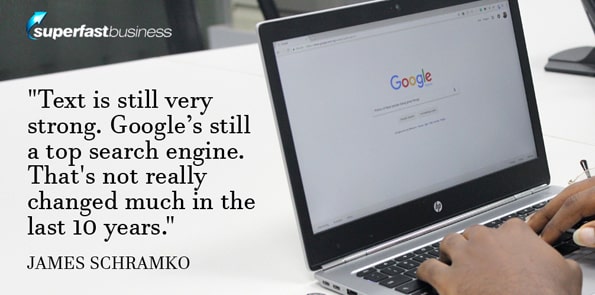 Changes in the field of marketing
Changes in the field of marketing
James: It would be sort of interesting today to chat about some of the changes that have happened over the last decade. I think content has still become, it’s still a very important pillar of driving a business. I still use content marketing as my primary marketing channel, and we still transcribe our podcasts into text format. Text is still very strong. Google’s still a top search engine. That’s not really changed much in the last 10 years. And now with Facebook, some of those long-form content pieces are driving lead magnets and generating activity for people. Are you still seeing people have a demand for the written content?
Kerry: Oh, absolutely. One of the changes though, I suppose, is the length of the content. When we started working together, we were writing articles that were around 400 words in length. But as you mentioned, the long-form content has really come to the fore now. And that’s what most of my clients are looking for.
James: I think there’s been a lot of studies published, and I think Neil Patel comes to mind, showing that long-form content drives good search results, and that they get good rankings and people stay on the site longer. These are all things that Google like to see if they’re going to rank a site. Certainly, when we transcribe our podcasts and put them on a single post, they end up being quite long.
Kerry: Yeah.
James: Also, I think there’s probably some kind of arms war race, you know, with content. If you look over the last 10 years, probably the quality of content has had to improve to even maintain the average, you know? Like content inflation.
Kerry: Yeah, yeah, I guess that’s the case. One of the problems, one of the hurdles that I face often though, is when some of my clients want long-form content, but the topic that they want it written about is so shallow and so targeted, you know, to write a 2000-word article about something so irrelevant or unsubstantial is really difficult. So I have to then go back to them and say, either expand the brief or let me write lists, because if there’s one thing I hate, it’s having to pad out an article in order to reach a word count.
James: Do they usually give you a topic or a draft or phrases or the open invitation to research?
Kerry: Well, I’ve got a fairly detailed brief that I’ll ask my clients to complete at the beginning of a project, and that will include things like an avatar for their ideal client, or just a description of their ideal client; who their competitors are; where their authority sites might be that I could reference. If they want to give me keywords, by all means they can do that. But I ask them for quite a bit of information, and over the years, I think I’ve worked out what I need in order to deliver to the specification.
A number of phases
James: Nice.
So we went through quite a few phases. I remember the very beginning, it was as many 400-word articles as we could get. I looked up, most of that I think you were the first external contractor that I hired in my business, and the other one was the help desk. So those two things were critical maneuvers for me, because I had someone else creating the content, and someone else looking after the support requests, which in my case was people claiming a bonus, because that was my primary strategy. But the way that I worked out that it was OK to do that was, I working out, what’s my return on investment? I think I was ordering articles 10 at a time.
Kerry: Yep.
James: And lots of those 10 packs. And then I would publish them, sites like EzineArticles and on my own website and a few other social media properties that were popular back then. And hopefully, the traffic from that would cause enough affiliate sales to pay back the articles. And it didn’t always come immediately. So I had to invest in the articles up front, and then I had to hope that they paid for themselves. And I think my theory panned out and it worked well, and for years were we had a ton of articles coming.
You actually built a whole business around that. You went from a temporary reception role at that front desk in a Mercedes dealership to having KerryFinchWriting.com. And it’s been wonderful watching you build that business and have the independence. And you had a sea change as well in that time, and you’ve stayed close to the community, interacting with when we have our annual events, and I see you at some of the local meetups.
Not a common job
How do your friends react to what you’re doing? Because I’m sure it’s still not that common a job, what you’re doing?
Kerry: No, it’s not common, and certainly not common for somebody of my age. And I know a lot of younger people, when they do hear what I do and how I do it, they’re completely gobsmacked that this job exists and that I’ve created a business out of it. So I’ve learned to watch their eyes glaze over, my contemporaries, and I know when to stop talking about it when they’ve lost the plot. So you can only go into so much detail, but I like that. I like that, and that’s why I guess I love going to the local meetups and to your events, because people, everybody gets what I’m doing and I get what they’re doing. It’s just a lovely community to be a part of.
The London adventure
James: It’s kind of fun, isn’t it? Do you remember when we went to, we used to travel to different countries together, which was awesome, because I really valued that support. You were kind of like my team manager. You know, we would travel to different countries, went to the UK once, and I remember sharing what we do with this big audience. I think it was like day two or three, they’d been spoken to by every other speaker over that event. And they were kind of glazed over by the time they got to us. We were dead last. I think it was second last until someone pulled out right?
Kerry: Yeah, well, it wasn’t quite there. This was in London, and I’d been trying, they gave you a 90-minute slot and you really wanted more but I couldn’t get that for you. But then one of the other speakers pulled out, and I think you were either before lunch or after lunch, I’m not sure, and the speaker that pulled out was on the other side of lunch. So I went to you and said, “If I can grab that other spot, do you want it?” And I saw your eyes light up and you said, “Go for it.” So we were going to try and get three hours on stage with these hundreds of people in the audience.
So the organizers weren’t all that fussed with it, they said, “Oh, no, if you break it for lunch it slows down the momentum.” And we said, “No, no we can do this, we’ve got something organized.” So they agreed. I think this was just the day before. And so we went into action mode and you changed around your whole presentation and then we went out shopping for hoodies, which played a vital role because you’re sort of, the image that went with your business at that time was of you with your head down with a hoodie on and so on.
So what our plan was, for you to do your regular talk about strategies and so on, which can be a bit analytical. But at the halfway point when we were about to break for lunch, you said that you’d like to help a few people in the audience to apply those principles to their business – who’d like to join you for lunch? And everybody put their hand up, and you picked out I think, four or five people from the audience. And there was one person in particular, a woman who was very persistent and you said, “OK, well, you can come too, but you can’t talk.” And she said, “Oh, OK.” And everyone laughed.
So there was five or six people. We took them off to a lunch room that I’d organized and had a white – not a whiteboard – a flip chart put in there. And you ask them all to explain what their business was and what their challenges were. And you took each of them through the process of what they needed to do to get it on track or take it to another level. It was amazing. And so they were happy with that. And then you told them that, “OK, after this, when we go back on stage, you’re going to have to tell people about this.” And they said, “OK.” So you gave them each a hoodie.
And onstage, you asked me to bring on the flip chart, which I did and I was quite unprepared for you to say, “Oh, and I want to introduce Kerry to you.” And I had to tell my story about how we met and how I created my own business and so on. And everyone was really taken with that. In fact, I got my first ever standing ovation after I left the stage. So I was famous by association for about an hour.
James: No, I think famous by merit. You earned it.
Kerry: Yeah, yeah.
James: That’s why they call you the super Finch, because you snagged the extra spot.
And I remember handing the mic around to them, saying, “Listen, we just spent 10 minutes together, what did you learn?” And they said, “Oh, you’ve just shown me why what I was doing was not getting the result and what I should be doing instead.” And people started running to the back of the room to buy whatever we were selling. They didn’t know how much it was or what we were selling.
Kerry: That’s right. Yeah, it was amazing. Each of the people that you’d worked with went through the flip chart and explained to the people in the audience exactly what direction you gave them. It was just reinforcing, practical reinforcement of what you’d been telling everybody in the first half of the presentation. It was so powerful.
And yes, people started moving towards the back, but then you moved on after they’d left the stage and you went down through some more details and then went into the usual pitch mode where you told what the package was and how much it was. And the price went down and more people moved to the back. And then the price went down again. And more people moved to the back. And the organizers were saying to me, “Tell him to stop, don’t let him go any lower, because they want to buy at that price.” And, you know, there was no way to do that.
But so anyway, at the end of it, there was complete mayhem at the back of the room. And the next speaker who was, I don’t know if you remember who it was, but he was pretty, pretty high profile at the time. He grumbles to the organizers. “Oh, now I have to go on stage after he sold the f*ck out of everybody.”
An incident in Dubai
James: Oh, dear. Well, timing can be everything at these events. Because I remember at the event after that, when we went to Dubai, one of the speakers from this event saw what we did and copied my whole slide deck.
Kerry: Yeah, same guy.
James: And he spoke before me, and then I had to redo my entire presentation. It’s a dirty industry in some ways. I remember leaving that particular format of speaking because I didn’t like some of the ethics of the other presenters. And some of the promoters were a little bit slow on the payments sometimes as well.
Gosh, I actually remember we sold 98 of our offer at 1000 pounds each, so it was a really productive afternoon. The most remarkable thing was that I wasn’t selling a live event or any actual physical thing this time, so it was a fully virtual delivery of what I was selling, and that’s really where I started. This sort of thought was, what a magical environment we’re in, where we can create things in our imagination and translate that through our words on a page or in this case, at an event and people can enter into this magical world of business and marketing online.
From organizers to members
Kerry: Oh indeed. And what was another thing that was interesting about that event was that among your signups for that were crew and organizers of the event. You’ve still got a couple in the forum now.
James: This happens all the time. In fact, I just spoke in Queensland and I’m now coaching the event organizer.
Kerry: There you go.
James: And two of the other speakers have applied to work with me. So that’s quite common, and I love it, because these people are seeing all the speakers and they’re running these events. So yeah, the guy who was running the sound desk joined, and he’s still in my community, and his wife. And this is, gosh, that was 2009 or something, it’s really quite a long time ago.
Kerry: It was, yeah. What a fantastic memory.
Kerry: He even moved from the UK to be there, to be in Australia, be closer to you.
James: I know. He’s in another state. He’s such a lovely guy. I like working with people… I remember too, with him, he had natural ability. And I think this is probably my knack, is if there’s people around me who have special skills, I will notice them and then I will bring them out if possible. And I remember he was adding sound effects and doing cool stuff when I was presenting. And because we presented in Ireland as well, I just said, “Look, go for it. Whatever you think’s appropriate, just use it.” And he was adding in some music, some soundtracks, some clips, and it was enhancing the performance.
Kerry: Yeah, exactly. The music he played when those five people marched on stage stealthily in their hoodies, it was just perfect.
“Don’t just accept the way that things are always done.”
James: I think that was an extraordinary event, and really the takeaway there is to innovate, so don’t just accept the way that things are always done, and to entertain. I remember the bidding process when I offered people to come to lunch. They were standing on chairs and shouting, like a competition. And some guy was saying, “Oh, I desperately need to come, I’ve got eight kids, I got no money and I don’t even know what I’ll do.” I’m like, “Mate, I don’t think we’re going to get anywhere.” Because I don’t like the desperation card so much, I find that one is hard work. Wrong attitude.
Giving a result first
And also, you know, the way that we did that was we actually created a result for people on the spot with a very low barrier for them. Like, they didn’t have to pay for that, they got the result first. It’s really why I like to publish so many podcasts, and I let people take the free course that I have on my website. I want people to get a result before they even want to become a customer. That’s a really low-risk way of moving forward into the business.
Now it’s the same as if you’re dealing with KerryFinchWriting.com. You’re dealing with my very first and extraordinary writing talent who you know, I guess we discovered a decade ago and you’ve got a long time in the trenches now. You’re probably one of the most seasoned pros out there, which is kind of funny from where we started.
Kerry: Yeah, indeed. It’s really funny. It’s so nice, though, to have so many members of your community as my clients, and they’ve been there for many, many years, probably from when we first started doing the events. And they’ve stayed with me. And even if, you know, they drop off for six months or a year or so, they always come back. I’m always there, so their first choice to come back to, and it’s just a lovely, lovely relationship between. I think that’s just typical of your forum, your community.
James: Yeah, they’re great. I was just looking at the average membership is now over three years for our members, which is a testimony to the community and it’s made me think about running another event in April 2019 in Sydney.
Kerry: Yeah, I’ll be there.
James: Bring the family together, the band’s getting back together.
Since the heyday of the press release
We went through a phase then of doing fairly intensive press releases. There was a time where it was easy wins for search engine results. It was good positioning and we were able to get great distribution. I’m wondering what sort of changes you’ve seen since the heydays of press releases. Do you still do them from time to time?
Kerry: I do them, but not in the same way that I did then. I mean, back in those days, the press releases had become so popular that they equaled almost half of my writing business. It was phenomenal. I couldn’t churn them out or load them to sites like PRWeb fast enough. One client had me writing four each week, he was so ecstatic with the results. And it was amazing how I was able to make a sales pitch sound newsworthy. Maybe this is where fake news began to rear its ugly head.
James: So the super Finch invented fake news.
Kerry: You said it. You said it, not me.
“Find the hook or the story that needs to be told.”
James: I think propaganda has been around well before the internet. But I think there’s a fine line with press releases. And I know that we always had this thing, like we’ve got to find something that’s actually newsworthy, or else we’re really just bordering on web spam. So you got to find the hook, or find the story that needs to be told. And that’s an important aspect of it.
Kerry: Yeah.
James: And, you know, definitely they have huge payoffs and dividends for, you know, the system just worked at that time. You could rank on the first page of Google within hours of releasing a press release. And some of them still turn up now when I’m searching for stuff, which is interesting.
Kerry: Very interesting, yeah. Well, before I was involved in digital business, I was working in marketing and writing offline press releases. So I still do some of those, and they’re distributed through more traditional AAP-type distribution services, but they have very strict guidelines on what is and isn’t news, and they’re expensive, so it’s not something you can do for $65 like we used to with PRWeb. It’s hundreds and hundreds of dollars in order to get good distribution. But you can quite easily target very, very specific niches through the ways of vertical targeting. They’re very effective still, but it’s got to be genuine news and generalists aren’t going to publish anything that isn’t something that’s going to be useful to readers.
Other content Kerry does
James: So we’ve talked about short articles, long articles, press releases. Are there other types of content or copy that you are involved with?
“It’s all about the giving and not always the taking.”
Kerry: Yeah. I’m doing a lot of lead gen reports. They’re very worthwhile. I think people are finding having those PDF reports on their websites very, very useful. It’s all about the giving and not always the taking, so reports that deliver good value without delivering the whole solution. So that’s another big part of my business now. And social media posts.
And I’m doing a lot of web page content as well. So if people are starting out their new websites from scratch, I’ll do their homepages, their about pages and services and things like that. So web pages. I like doing those. I usually do those myself, whereas I might give articles quite often to my team. But I like doing web page content.
James: So you’ve built up a little bit of a team now, and you’ve got, I think you’ve got like, the international All Stars, so they’re from all around the place?
Kerry: Yeah, mainly from North America and Australia. I’ve got one who is a specialist medical writer and she’s in the UK, Nisha. And then in the Philippines, I’ve got Christine who is a lawyer and she’s been with me for eight years now. And she writes a lot of my legal content, mainly for the US and Australia. But the others are North American, Canadian, American and Australian.
Content issues to consider
James: Right. So what do you think are the big issues when it comes to content? So if you sort of step into the mind of your average customer, very likely someone listening to this podcast, what things should they be considering when it comes to what sort of content they might be looking to produce?
Kerry: Well, I think without just looking at the content, I think they should be looking at the content plan realistically, that they don’t ask for 10 articles like we did in the old days and expect instant search engine results. One of my key clients has been with me for four years now, and he just raves about how it has built up momentum over the years and how he couldn’t do without my articles now, it’s just given him such a solid base for his business.
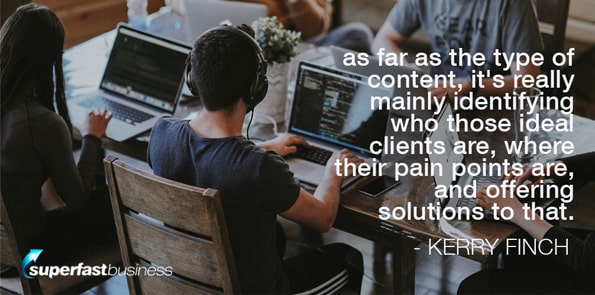 So I think approaching it realistically is good, to not expect those instant results and that you have to be a bit patient in order for those articles to give you the traction. But as far as the type of content, it’s really mainly identifying who those ideal clients are, where their pain points are, and offering solutions to that. I mean, nothing’s really changed in that regard. It’s always been so.
So I think approaching it realistically is good, to not expect those instant results and that you have to be a bit patient in order for those articles to give you the traction. But as far as the type of content, it’s really mainly identifying who those ideal clients are, where their pain points are, and offering solutions to that. I mean, nothing’s really changed in that regard. It’s always been so.
The actual crafting
James: And when you’re actually sitting down to craft your article, do you break that into segments now? Have you got a formula that you like, where you introduce a topic and you put forward some aspects and maybe counter them and come to an opinion or something like that?
Kerry: Yeah, yeah, exactly like that. And so that’s the formatting of the flow, but then also adding your subheadings and bullet points and things like that. And they’ve become increasingly important with mobile technology, because people are reading content on their phones or tablets now, and they’re skimmers more than ever and they want to see those bullet points and headlines so that they can easily see what the content’s about before they explore it in more depth.
“Optimize for the mobile.”
James: Nice. Yeah, I think you have to optimize for the mobile, that’s very important. And yeah, right, for the two readers, the skimmer and the detail-oriented.
Kerry: Yeah.
James: Do you put calls to action throughout the body or just at the end?
Kerry: Well, sometimes I don’t put calls to action. Sometimes it’s all about the giving rather than any taking. So no, I don’t usually put a call to action throughout the article. I might embed an idea about the particular expertise of this client in this area, but a call to action I’ll usually leave at the end.
James: So it might be the point of the article might be to bolster someone’s authority so that they get better invitations from media, that sort of stuff.
Kerry: Exactly.
James: Do you have anyone writing stuff for places like Medium? Which I guess is probably the modern day equivalent of Ezine articles.
Kerry: Not specifically. Well, I have one client in the US who is in that field, in the home improvement field, but she’s the only one, yep.
James: Most people put in the content on their own site?
Kerry: They’re putting the content on their site or on social media. We sometimes recreate, we’ll do a second version of an article. They might put one on their site but then do a slightly different version to put on something like LinkedIn or on their Facebook page, and yeah.
The surprise that is LinkedIn
James: Yeah, LinkedIn’s been a surprise for me. It seems to like videos too, and I guess if you have that sort of content, it’s easy to write around it, where you can summarize or highlight, timeline or curate…
Kerry: Yeah, that’s right.
James: …what’s in the video.
Kerry: I know you didn’t love LinkedIn at the start.
James: I didn’t like it up until a few months ago, really, and it was a community member of ours, Julie, was telling me how I might be able to use it better. And I gave it a shot and it’s worked out to be quite effective, and a surprise. So there you go. You got to be open to try new things or even trying things you’ve tried before a different way and get a different result.
Kerry: Yeah. Yep, that’s right. It’s a constantly evolving environment and you have to be there and give things a go and try them for yourself and not rely on what other people say, as well.
James: Well, sometimes not even relying on what you say. Because I just remember, I was having that discussion in our forum in SuperFastBusiness, just saying how I’m not really a fan of LinkedIn, and she just said, “Look, would you like to hop on the phone and I’ll just share with you a few different ways that you can make it work for you better?” And I did that, and it worked better.
So apparently, it’s more important to get profile views with LinkedIn than it is for most other metrics that you might look at. And if you can bolster that, then you really want to beef up your profile page, because that’s what they’re looking at. And it’s from there that you can have people take that call to action. And I found that videos there, some of them are getting watched 50 times more than when I put them on Facebook or YouTube. So, you know, that was the surprise.
Kerry: Yeah, that’s interesting. Yeah.
James: Yep. I also, I should point out that it was Julie Mason who helped me. She’d probably be thrilled to know that I’ve given her a shout out. Maybe I have her come and talk about LinkedIn in more details.
Repurposing factors
But when you repurpose it for different places, what sort of things are you taking into account?
Kerry: I think the different audiences, because all of those platforms have different audiences, and you have to tweak it accordingly. LinkedIn is mostly B2B, whereas Facebook or your website might be B2C clients. So, yeah.
James: Yeah. Having a different conversation.
Kerry: Yeah.
James: Yeah, that makes sense. And I think if you’re putting stuff on your own website, it’s nice if you’ve got the original version of it, right? Because even if you put the same content on two different websites, a more powerful website will usually outrank the less powerful website, regardless of who published it first, or whatever else.
Kerry: Yes, that’s right.
Is interlinking still a practice?
James: Things like interlinking words, do you still do that sort of stuff?
Kerry: Yeah, to a certain extent. We’re linking probably to authority sites more than we used to. In the end, there was always the perception when I first started writing that if you put in an external link in your content, you’re taking your readers away to a different site. But now the search engines value those links to authority sites, too. So we’re doing that sort of thing.
James: Yeah, I know. Even, I guess, you know, if you’re an old SEO head like us, you can’t help it. I remember my last guest that I recorded on the podcast before this one with Josh Marsden. I remember he was rattling off the tools that he works with, and I was just thinking while he was talking about those tools, how nice it will be when Google comes along to that transcription and they hear about Infusionsoft and ClickFunnels. Every time we mention a word and it gets transcribed, that’s putting the content that our audience is searching for. So it makes sense. I just did it then too. I couldn’t help myself.
Kerry: Haha.
Memories from the past decade
James: Do you have any other particularly interesting memories of the last 10 years, some of the things that we’ve tried or done or seen with regards to content or anything around that?
Kerry: Now, I was thinking about the different events that we used to do, and I know it was talking about that London episode was really good, but you balance that off with probably the less enjoyable times. I remember when we were in New Zealand and you were working on your presentation until way after 3am. And that time in Sydney, where you lost your whole slide deck on the morning of the presentation and you were rebuilding it as the earlier speakers were on stage. But while you were doing it, you were countering some of the textbook things they were coming out with and challenging concepts like having a five-year plan and that sort of thing. It was so funny to watch.
James: Contrarian. Well, that’s kind of the thing with those multi-speaker pitch events. It’s a competition for the audience’s dollar. And being competitive, you want to put yourself in a better position. It was super strategic. These days, when I speak at content events, which is primarily what I do, is I will sit in the room and I’ll support the other speakers’ things that I agree with. So I guess I’m softening up a little bit in my old age, Kerry.
Kerry: Oh, you are. You are.
James: You know, and then also that New Zealand event, that’s where I met the original SEO contractors who I ended up building a business around, that we brought in-house and turned into something quite significant. So getting out on the road and meeting interesting people was, it was a lot of fun back then.
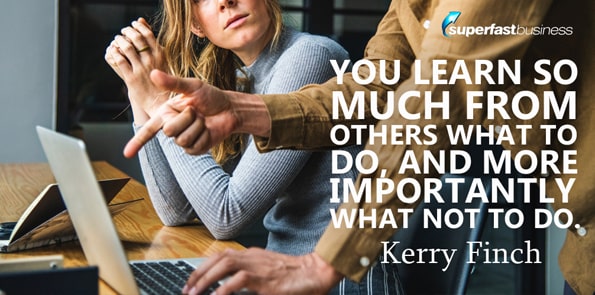 Kerry: Yeah, you learn so much from others what to do, and more importantly what not to do, I think.
Kerry: Yeah, you learn so much from others what to do, and more importantly what not to do, I think.
James: Remember that time I turned up at the airport and you asked me if I had my itinerary, and I didn’t? You and the three other people were shocked. I did have my passport.
Kerry: That’s alright. I had the itinerary.
James: I also remember when we went to Dublin. We set off the metal detector and we saw…
Kerry: Wait, you know it was me.
James: OK. I’m just being polite. But somehow you made it from Sydney to London. All the way to the third airport. They found, was it a knife or something? Or a nail file in your bag?
Kerry: It was a pair of scissors.
James: Scissors, right. Scissors.
Kerry: Yeah.
James: That was kind of fun.
Kerry: But they couldn’t find it. They could see it on the X-ray machine, but we took everything out of my bag and we still couldn’t find them. Then we realized that they’d actually worked their way, they cut their way through the lining of my bag, and were sitting in there. So, you know, that was, yeah, that was just par for the course. But you’re right, we’d made it out of Sydney to London to Dublin. And we were on our way back from Dublin to London before it had actually set off any alarm, so that’s a bit scary.
James: Yeah, that’s crazy stuff. Yeah. You know, it’s funny, like, people look at my lifestyle now and the idea of working less, making more and surfing and stuff, but I did put in the effort, I really did, with those all-nighters, and slide builds and traveling and building audience, just earning that the hard way. But I think there’s easier ways to do it now. And that’s, that’s really why I was excited to put together a book and talk about how you might just sort of jump some of those steps.
And it’s like, now, instead of having to figure out how to type articles or whatever, you just hook into an existing established service provider and just get it done. That’s really the first big power move of my entire business, was going from just me to me and Kerry and having that turning on the turbo. And that’s when the affiliate commissions started to accelerate, when I was speeding up the amount of content that I could produce and put into the market.
And if I look back at it, I think we had an advantage then, because our content was significantly better than everyone else’s content, because they were just spewing stuff out at the time. You know, ordinary normal people were writing the articles, and you’re a pro. And then, you know, you figured out what works and you keep doing that. So it’s been a really exciting ride.
Kerry: Yeah, it’s been a great journey. Yeah. I love the quote in your 10 years podcast. And you said, you can change almost every aspect of your life in a decade. And I know that’s true for me. And I know it’s true for you.
James: Yeah, I think you could probably even do it twice in a decade. I’m being conservative, but it’s absolutely… Think about that day when you and I were sitting in my office, when I had a job and I was on a salary and you were a temp. And we’ve both built our businesses out over that last 10 years and done something significant. And it’s a great celebration I really look forward to.
Where are things going?
I know you’ve spoken at my event, and we’ve chatted a few times here and there. But it’s really nice to look back and see how we got here, and also what’s changed. And I guess it’s probably fitting to see, where do you think things are going?
Kerry: For me in particular?
James: For you, and I guess when we talk about you, part of you is your business as well. So, like, how do you feel that’s going to move forward? What sort of demands and changes do you see in the content world and from the sort of things your clients are asking you for? Because I know some of them are quite innovative and they probably bring to you ideas and things they’ve seen. What sort of things do you anticipate we’re going to be looking at over the next year or two?
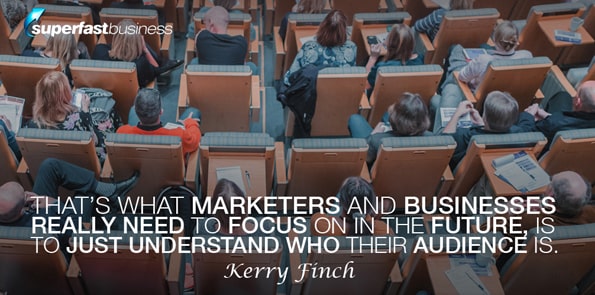 Kerry: Yeah, interesting. I think, yeah, they’re all so very different. And they’re all tackling things in different ways. So I tend to just roll with what they’re doing. And I guess that’s probably the route I’ve chosen is to not explore any of those innovations but to write according to the directions of them, understanding that more often than not they are the experts. But yeah, there are some things that I find that, well, I mean it’s not really speaking to your point, but there are things that I find a little bit difficult to overcome, and often it’s the perception that… I suppose I’ll talk about law firms. It’s law firms that I can find quite challenging, because they, and I do work for a lot of them, over 40 in the past, and it’s the language they use. It’s like they’re speaking to impress their colleagues and their competitors. They’re not speaking to their audience, as we’ve already touched on before. And I think that’s what marketers and businesses really need to focus on in the future, is to just understand who their audience is.
Kerry: Yeah, interesting. I think, yeah, they’re all so very different. And they’re all tackling things in different ways. So I tend to just roll with what they’re doing. And I guess that’s probably the route I’ve chosen is to not explore any of those innovations but to write according to the directions of them, understanding that more often than not they are the experts. But yeah, there are some things that I find that, well, I mean it’s not really speaking to your point, but there are things that I find a little bit difficult to overcome, and often it’s the perception that… I suppose I’ll talk about law firms. It’s law firms that I can find quite challenging, because they, and I do work for a lot of them, over 40 in the past, and it’s the language they use. It’s like they’re speaking to impress their colleagues and their competitors. They’re not speaking to their audience, as we’ve already touched on before. And I think that’s what marketers and businesses really need to focus on in the future, is to just understand who their audience is.
The case of the lawyer client
James: You made me smile big time. I remember a lawyer client that I had, and we were ranked at the top for SEO and we had fantastic traffic. All the leads were converting. They were just smashing it. And then remarketing came out and I asked them to get from their creative agency some banners in these particular sizes, so we can run remarketing. I explained to them what it was. They were like, pretty blown away by this whole concept.
This was probably six years ago or whenever. And they came back and they said, “Oh, we’ve also signed up with the agency for a new website.” And I’m like, “How much is that?” And they said, “Oh, like $25,000.” And they hired an actor from a well-known radio show here, and they had this video thing. So they scrapped the amazing site that we had and they had this full-page video guy just walking in and saying, “Hi, welcome to blah blah blah Legal.” Right? It’s like exactly what you said. It was like they were trying to impress other solicitors, not their target audience.
And the thing dropped like a rock out of Google. It stopped converting, and they had an emergency board meeting and they called me from the group call and they said, “Can you please…?” By the way, I fired them for that. I said, “I can’t work with you guys, because you got no idea what you’re doing.” And they begged me to come back and save them. And I reinstalled the old site, and we went straight back up the top of Google. It was like a $25,000 lesson in what not to do.
Kerry: My god.
James: Yeah. They got hoodwinked by some fancy agency and they just got it so wrong. It was really fascinating. That’s like, that’s when I knew our street smart direct response internet marketing background tuned us into what works.
“Sometimes it’s just sticking to your core principles.”
The things that work
Kerry: Yeah. Sometimes it’s just sticking to your core principles and forgetting about all the flashy whiz bang, lights flashing stuff and just go back to basics, to a lot of extent. And that’s where I find the people often let content, written content in particular, slide, when they get distracted by other clever bells and whistles type things. And as you know, you’re still doing content, I’m still writing content. It’s really at the core of every digital marketing campaign. And when people let it go, it’s really hard to claw back.
James: Well, I’m just enjoying a really great SEO catchment from SuperFastBusiness. Even transcribing these podcasts is enough to drive an enormous amount of traffic. I still haven’t hooked up my super chatbots and all that stuff yet, all the fancy stuff. I do believe in good design, and I think that goes hand in hand. If you can make your content look nice, especially those PDFs and your homepage and any landing page, if you can make them look nice (I love getting help from Greg Merrilees for that), then it’s a nice way to wrap the good content. So if your content’s actually good and you create it and it looks good and it speaks to your audience, then I guess you’ve ticked a few boxes that your competitors might be missing.
Kerry: Yeah.
Some words in parting
James: Well, great to catch up, Kerry. Any words of wisdom to our listener as a parting advice?
Kerry: No, well, yes. I say, if you’re not already in James’s community and you want more of this sort of guidance, the kind of mentoring that James has given me over the last 10 years and especially in those early stages, get into SuperFastBusiness and learn from James and learn from the others in there. It’s such a dynamic community, and I’m really pleased I’ve been there from the start.
James: Oh, that’s very nice. I’ll mention KerryFinchWriting.com…
Kerry: Hey, let’s do that one more time.
James: …and balance that ledger. Yeah, no, if you want to get some good content from the very first person that I worked with with content, then I recommend you head over there and get some help from Kerry. So Kerry, wonderful to chat and be good to catch up at least…
Kerry: Hey, I’ll see you next April.
James: …at the latest, in another 10 years and see what’s happening then.
Kerry: OK. Thanks, James. Bye.
James: Yeah. See you then first. Ba-bye.
Hang out with James and Kerry inside the JamesSchramko membership
Liked this episode? Keep up with our podcast by subscribing on iTunes
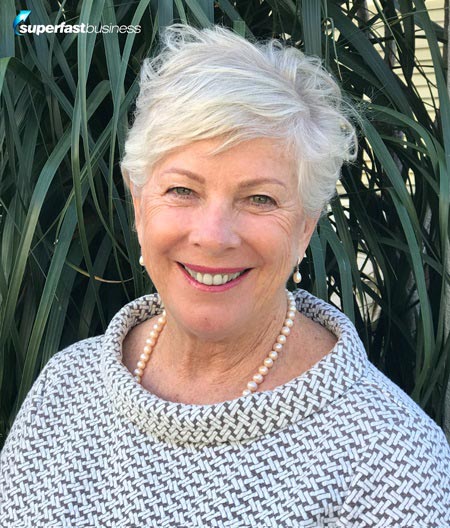

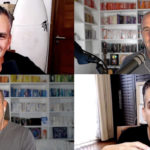

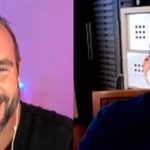





Picked up some excellent key points on content writing by listening to Kerry and James. But James a “Scary Dude” He must have mellowed over the years :) I too am looking forward to the SuperFastBusiness event in April 2009.
. .
Thanks Kenny, you’ve been there for the whole journey too!
Picked up some excellent key points on content writing by listening to Kerry and James. But James a “Scary Dude” He must have mellowed over the years :) I too am looking forward to the SuperFastBusiness event in April 2019.
. .
I was a bit tougher for sure hahah!
Thanks Kenny, you’ve been there for the whole journey too!
I too am looking forward to the SuperFastBusiness event in April 2019.
I too am looking forward to the SuperFastBusiness event in April 2019.
will be awesome Ken!
Kerry is amazing! Ever since James referred me, we have not looked back. All of our content that Kerry and her team create is first class. I am so so glad to have found you Kerry :) thanks for another great episode to listen to James :)
Kerry is amazing! Ever since James referred me, we have not looked back. All of our content that Kerry and her team create is first class. I am so so glad to have found you Kerry :) thanks for another great episode to listen to James :)
That’s so nice Gary ! Thank you.
Thank you Gary, I’m really enjoying the projects we’re working on, and I’m learning lots from you too.
The rise and rise of Kerry Finch. There’s a book deal in that for you, I’m sure.
It’s coming on ten years since we first did some work together. Here’s to the next ten!
Thanks Clint – it’s been such a ride. I am so blessed to call you my friend.
Kerry
Thanks Clint – it’s been such a ride. I am so blessed to call you my friend.
Kerry
Thanks Clint. Its been a real pleasure, and I’m so pleased to be able to call you my friend as well as a business associate.
Thanks Clint. Its been a real pleasure, and I’m so pleased to be able to call you my friend as well as a business associate.
Kerry, you bring so much value to our Peachymama brand! High % of our sales come through our blog :) Good to get a little more insight into KFW and as always, great interview James! Thankyou.
Kerry, you bring so much value to our Peachymama brand! High % of our sales come through our blog :) Good to get a little more insight into KFW and as always, great interview James! Thankyou.
Nice one Owen!
So kind Owen. I love the bond we’ve developed over the years, and look forward to it continuing into the future.